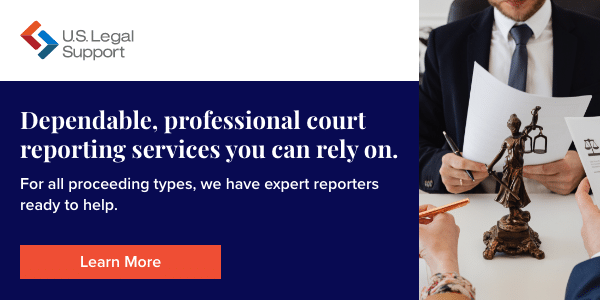How to Hire a Court Reporter: A Comprehensive Guide

Just as with a paralegal or legal secretary, an experienced court reporter is a vital part of your legal team, and performing your due diligence in the scheduling process can help preserve your firm’s efficiency and reputation. Often engaged on a freelance basis, court reporters are responsible for creating an accurate transcript, helping to ensure confidentiality, and often providing realtime transcript feeds.
We’ve gathered top tips and notes for how to hire or schedule a court reporter to help you find the legal professional you need.
Why Hiring the Right Court Reporter Is Important
Today, there are multiple court reporting methodologies using a combination of technology and skill to quickly and accurately convert spoken words into text.
Choosing a qualified court reporter can help:
- Maintain the accuracy of the record
- Ensure you have the right skills for the job, such as remote reporting or live captioning
- Keep your case on track by receiving timely transcripts post-proceeding
Steps to Take When Hiring a Court Reporter
A last-minute web search for any available court reporter isn’t a great idea. Instead, follow these steps:
- Identify your needs – Will the job require a realtime feed, remote capabilities, or an immediate rough draft transcript?
- Set a timeline – Reach out as early as possible to your court reporter agency, particularly if you have specific technological, procedural, or case needs. While an emergency same-day job can potentially be filled, it is becoming increasingly more difficult due to the nationwide shortage of Stenographic court reporters.
- Vet the prospective court reporting agency – It’s important to work with a reputable court reporting agency who has a large network of professional court reporters nationwide. This can help ensure you get a credentialed court reporter, an accurate transcript, and timely delivery. Ask important questions to ensure they are prepared to support your case.
Tips for Finding the Right Court Reporter
To continuously schedule the right court reporter for your proceeding, be sure to:
- Secure your network – Lock in your relationships with high-performing court reporters or court reporting firms to make repeated use of successful court reporting resources.
- Work with a court reporting agency – Staying with a trusted firm allows you to offload the process of finding and vetting court reporters and provides a single point of contact and streamlined billing. It can also provide coverage for remote and out-of-state court reporting needs and established processes for file transfer, technical support, and more.
- Review the job when done – Once a court reporting engagement is complete, consider what went well and anything that went wrong. Use that information to adjust your future questions or requirements appropriately.
Court Reporter Qualifications to Consider
While there are many qualifications to consider, we recommend looking at:
- Completed certificate, degree program, or training
- Current state licensing
- Notary Public status
As far as certifications, there are four accrediting associations. These include:
- National Court Reporters Association (NCRA):
- Registered Professional Reporter (RPR)
- Registered Merit Reporter (RMR)
- Registered Diplomate Reporter (RDR)
- Certified Realtime Reporter (CRR)
- Certified Realtime Captioner (CRC)
- Certified Legal Video Specialist (CLVS)
- National Verbatim Reporters Association (NVRA):
- Certified Verbatim Reporter (CVR)
- Certified Verbatim Reporter – Stenotype (CVR-S)
- Military Verbatim Reporter (MVR)
- Military Verbatim Reporter – Stenotype (MVR-S)
- Realtime Verbatim Reporter (RVR)
- Realtime Verbatim Reporter – Stenotype (RVR-S)
- Realtime Verbatim Reporter – Master (RVR-M)
- Realtime Verbatim Reporter – Master – Stenotype (RVR-M-S)
- Certified Legal Scopist (CLS)
- American Association of Electronic Reporters and Transcribers (AAERT):
- Certified Electronic Reporter (CER)
- Certified Electronic Transcriber (CET)
- Certified Deposition Reporter (CDR)
- United States Court Reporters Association (USCRA):
- Federal Certified Realtime Reporter (FCRR)
Note, most associations require recertification after a set number of years, so ask for the certification year and—if it’s more than a few years ago—whether they’ve completed continuing professional education coursework to recertify.
A Final Word on Hiring Court Reporters
The biggest reason to identify a useful and consistent scheduling process for court reporters is that you’ll do it again and again. Court reporting is an integral part of legal proceedings, and ensuring you work with the right agency and the right person for the job will help keep your cases moving smoothly.
Here at U.S. Legal Support, we can help you with just that. Our objective is to be your all-inclusive litigation support services partner, so reach out today to identify the next court reporter who will support you on your court case.
Sources:
National Court Reporters Association (NCRA). NCRA Certifications. https://www.ncra.org/certification/NCRA-Certifications
National Verbatim Reporters Association (NVRA). NVRA Certifications. https://nvra.org/page/Certifications
American Association of Electronic Reporters and Transcribers (AAERT). Certification Program. https://aaert.org/become-certified/certification-program/
United States Court Reporters Association (USCRA). FCCR Certification. http://www.uscra.org/fcrr-certification/

Editoral Policy
Content published on the U.S. Legal Support blog is reviewed by professionals in the legal and litigation support services field to help ensure accurate information. The information provided in this blog is for informational purposes only and should not be construed as legal advice for attorneys or clients.


